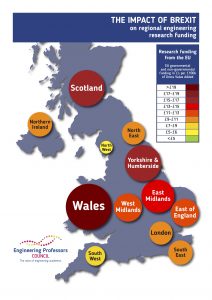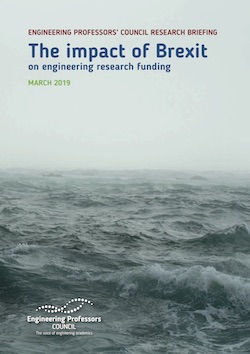MEDIA RELEASE
Contact: Johnny Rich, 078-1111 4292
Date: 28th March 2019
For immediate release
As the political crisis over Brexit continues in Parliament, an exclusive new analysis by the Engineering Professors’ Council reveals that a cascade of effects – resulting simply from Brexit’s impact on engineering research – will deal a blow to the economy nationally and will hit certain regions even harder.
The analysis shows the critical role EU funding has in fuelling innovation through engineering research, which boosts industry at a regional level, which in turn drives the national economy.
Engineering research in UK universities receives £877 million in EU-based grants and contracts and is the largest national recipient of such funding. Under current Brexit plans, the UK would no longer be eligible for these funds and even if they were directly replaced by funding from UK taxpayers, that would still not compensate for the loss of a ‘multiplier effect’, which, the EPC calculates, increases the value of international research revenue by a factor of 3.35 as well as providing soft benefits.
Engineering is just one area of the research that goes on in higher education that would be affected by Brexit, but it accounts for a fifth of the research conducted in UK universities and the engineering sector generates a quarter of the country’s GDP. The EPC’s analysis looks at the impact of withdrawing this funding stream only, but it recognises the impact will be exacerbated by other cuts to EU research funding.
Some communities will suffer more than others. Hardest hit will be Wales, where in 2016/17 all chemical engineering research was EU-funded and where, relative to size of the regional economy, the loss of funding would be greatest.

Yorkshire and Humberside, Scotland, and the East Midlands would be similarly badly affected, but no part of the country would escape some level of harm.
Prof Sarah Spurgeon OBE, President of the EPC, commented: “The EPC analysis is independent and objective, and it is undeniable that Brexit would cause severe damage to UK research and to the economic benefits which that research brings.”
“It’s all too easy to forget the number of jobs and businesses that are started or sustained by the engineering research done in UK universities, especially in those areas of the country where jobs in innovation are most needed. That research faces a 15% cut when we leave the EU and the shock waves will be felt by those who don’t even know that the research has been going on or who’s been funding it.”
“For the Government to plug the gap once that funding is removed will be less cost effective than ensuring we can continue to access the funding – and importantly – the collaborations that comes with EU membership.”
“On behalf of the academic engineering community and the whole engineering sector, we urge the Government to ensure that the UK remains closely tied to European research networks.”
ends
Notes to editors
- The EPC represents the academic engineers in the UK, with 85 university engineering faculties as members comprising over 7,500 academic staff.
- Our primary purpose is to provide an influential voice and authoritative conduit through which engineering departments’ interests can be represented to key audiences such as funders, influencers, employers, professional bodies and Government. All branches of engineering are represented within the EPC’s membership.
- The EPC Research Briefing is available to download here.
- Additional EPC analysis of implications for different engineering disciplines and regions is available at here.
- Data source: EPC analysis of HESA Finance Record 2016-17 Table 5 using Heidi Plus Online Analytics service





